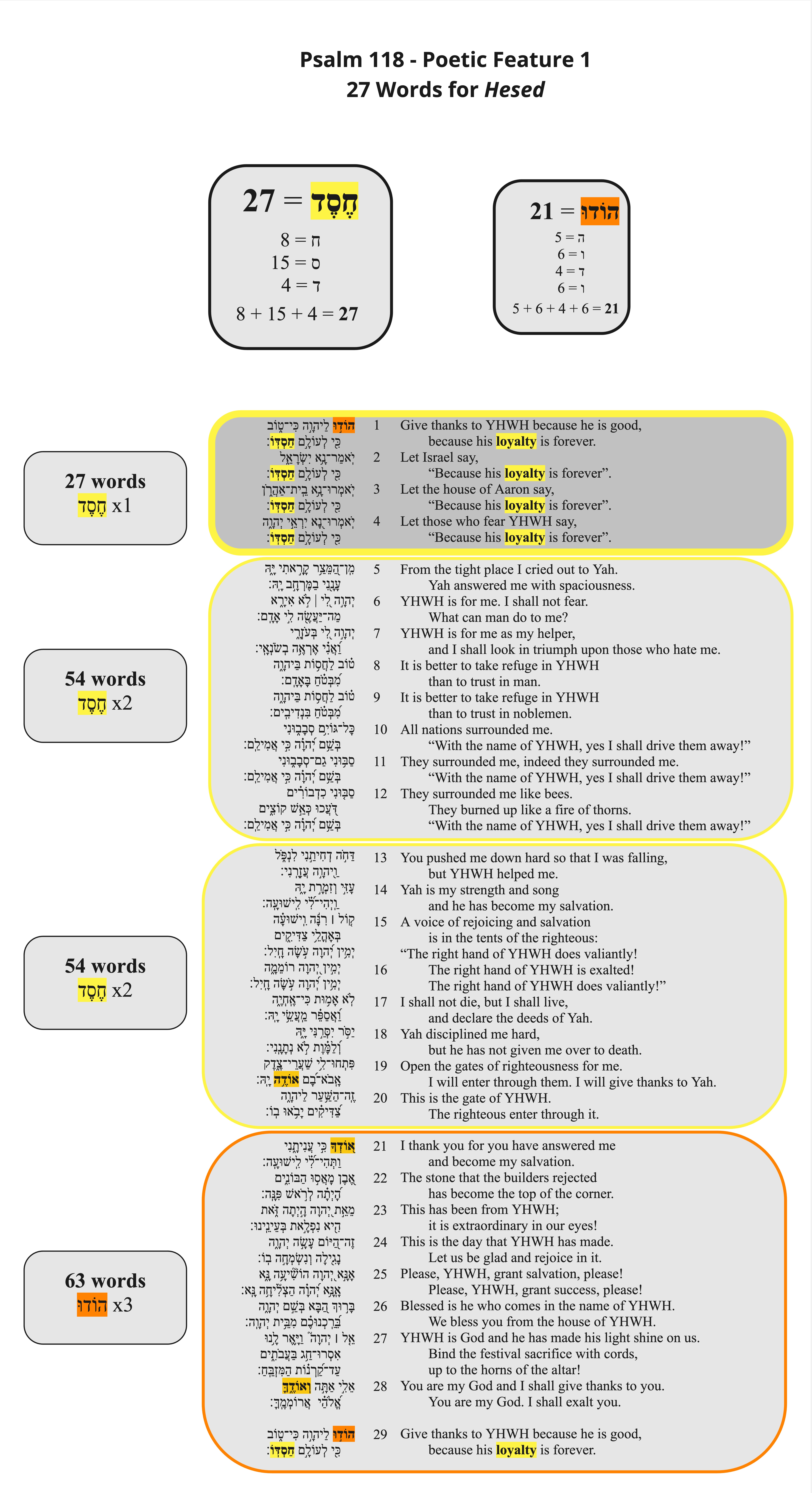Psalm 118 Numerical Poetic Feature
Feature
In Hebrew each letter of the alphabet corresponds to a number. Every word therefore has a numerical value, made up of the sum of its letters. Scholars have identified a number of cases where meaningful poetic patterns can be created in accordance with these numerical values (cf. Knohl, "Sacred Architecture: The Numerical Dimensions of Biblical Poems" (2012) and Labuschagne, "Significant Compositional Techniques in the Psalms: Evidence for the Use of Number as an Organizing Principle" (2009) - note that the system of counting here is different from later Jewish tradition, corresponding instead to the letter's exact position in the alphabet. Thus כ kaf = 11, not 20, and ל lamed = 12, not 30).
One of the most prominent words in Ps. 118 is חֶסֶד hesed - ״loyalty״, which has a numerical value of 27. It appears 5 times (vv. 1-4, 29) and provides the main reason for giving thanks (see הוֹדוּ below) to YHWH. One might say that the whole thanksgiving psalm is a celebration of YHWH's hesed, as it remembers all the ways that YHWH has been loyal to his people and saved them from distress.
But not only the content of the psalm tells of YHWH's hesed - so do the number of words! In the opening thanksgiving chorus there are exactly 27 words (counting words joined by maqqef as separate words) (Labuschange 2012: 5). This specific and intentional numerical structure creates an expectation of further numerical structuring around חֶסֶד's numerical value of 27. This expectation seems to be fulfilled in the following two strophes (see poetic structure) which are each organised into exactly 54 words (2 x 27). This creates three distinct sections (1-4 | 5-12 | 13-20) that point numerically and thematically to YHWH's חֶסֶד (loyalty).
The numerical structuring then seems to continue with the final section (vv. 21-29), corresponding to the numerical value of the key word הוֹדוּ hodu - ״give thanks!״ (vv. 1, 29), which has a numerical value of 21. There are 63 words in this section, multiplying הוֹדוּ by three, corresponding to the three חֶסֶד sections preceding. It is also noteworthy that there are three other key occurrences of הוֹדוּ's root ידה in vv. 19, 21, and 28.
And not only are these two participants—the lord and the Lord—described in similar terms, but in vv. 5-7 (especially v. 7), it is difficult to determine which of them is the subject. See "The Subject(s) in Ps. 110:5-7."
Effect
The central message of the psalm involves giving thanks hodu to YHWH for his loyalty hesed. This is captured most clearly in the opening and closing refrain (vv. 1, 29), "Give thanks הוֹדוּ to YHWH for he is good, for his loyalty חֶסֶד is forever!".
In re-telling the many expressions of YHWH's hesed, the psalmist does not just employ the meaning of his words - but also the number of words. In vv. 1-20 he creates "a mosaic of statements about YHWH's hesed" (Labuschange 2012: 5), with three sections all numerically and thematically testifying to YHWH's hesed, revealed in his salvation from distress. The required response to these three vignettes is of course to give thanks! Therefore the final section (vv. 21-29) seems to be numerically and thematically structured to call God's people to this joyful response.
